初中英语人教版八年级下册Unit 3 could you please clean
八年级人教版下册知识点学习与巩固:Unit3Couldyoupleasecleanyourroom

Unit 3 Could you please clean your room?词1. could you please ⋯你能⋯⋯? /你干⋯⋯.好?2.do the dishes 洗餐具3.sweep the floor 清地板4.take out the trash倒垃圾5.make one ’ s bed床6.fold one’s clothes叠衣服7.clean the living room 清客8.stay out late晚9.his father reason’他父的原因10.get a ride搭e one computer’s使用某人的12.hate sth./to do sth. 某事 /做某事13.do the laundry=do some washing=wash clothes洗衣服14.make breakfast, make dinner, do some cooking 做15.wash the car 刷 16. work on 从事,忙于17.work at 学、致力于、在⋯⋯上下时间make a face做鬼;make a fool of 愚弄,使出洋相make friends with 与⋯⋯交朋友make a name for himself成名make a note of注意,下来make free with 私自使用 makefun of 讥笑make⋯ into 把⋯⋯作成,使成make it 成功,抵达某make one’s living持生活make one ’ s wayto 前去某make room 出地方make up 造make use of利用24. borrow sth. from sb.向某人借某物(借入 )25.lend sb. sth.=lend sth. to sb借.某人某物 (借出 )26.ask for 要求获得、要求到27.take care of = look after 照、照看、照顾take good care of=look after⋯well 28. need some help需要一些帮助第1页/共9页18. borrow some money借一些钱29. come over过来19. invite sb. to do sth 邀请某人做某30. get angry生气事31. have a test考试20. go to the store去商铺32. make a clean sweep of 完全打扫21.agree sb. to do sth同.意某人做某事22.agree with sb. =agree with whatone says赞同某人的建议23.(需认识)make a deal作成交易知识重点1. ---Could you please take out the trash ?你能把垃圾倒掉吗?--- sure . 自然能够。
人教版八年级英语下-unit3-could-you-please-clean-your-room教案
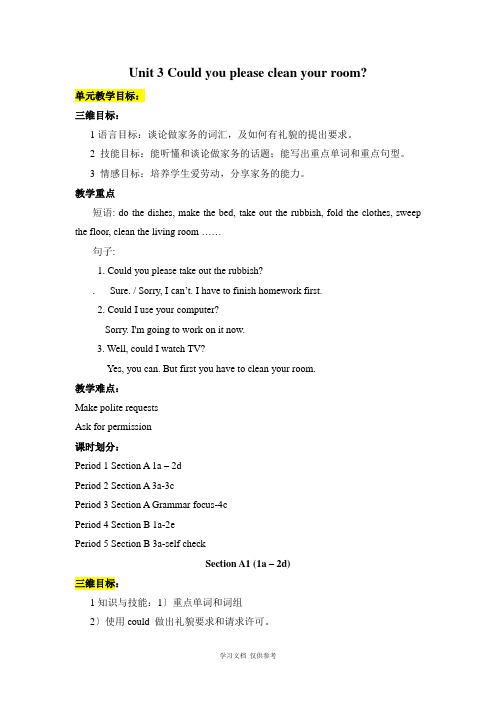
Unit 3 Could you please clean your room?单元教学目标:三维目标:1语言目标:谈论做家务的词汇,及如何有礼貌的提出要求。
2 技能目标:能听懂和谈论做家务的话题;能写出重点单词和重点句型。
3 情感目标:培养学生爱劳动,分享家务的能力。
教学重点短语: do the dishes, make the bed, take out the rubbish, fold the clothes, sweep the floor, clean the living room ……句子:1. Could you please take out the rubbish?. Sure. / Sorry, I can’t. I have to finish homework first.2. Could I use your computer?Sorry. I'm going to work on it now.3. Well, could I watch TV?Yes, you can. But first you have to clean your room.教学难点:Make polite requestsAsk for permission课时划分:Period 1 Section A 1a – 2dPeriod 2 Section A 3a-3cPeriod 3 Section A Grammar focus-4cPeriod 4 Section B 1a-2ePeriod 5 Section B 3a-self checkSection A1 (1a – 2d)三维目标:1知识与技能:1〕重点单词和词组2〕使用could 做出礼貌要求和请求许可。
2.过程与方法:通过合作探究的方法结局本课的重点知识点3.情感态度与价值:学会照顾自己,培养自己的独立意识。
教学重点:谈论做家务的词汇,情态动词could的使用方法。
2024八年级英语下册Unit3Couldyoupleasecleanyourroom单元主题写作习
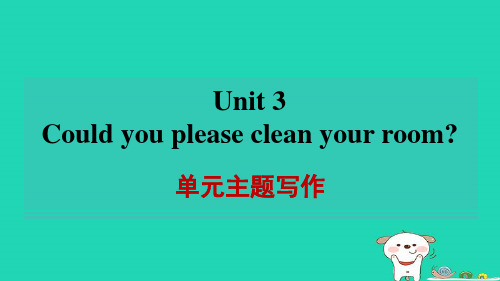
Unit 3 Could you please clean your room?
单元主题写作
一、话题分析 本单元以“家务与许可(chores and permission) ”为
话题, 围绕家庭中的日常事务展开。
二、素材积累 (一)“做家务” 类话题常用的词汇: do the dishes // take out the rubbish // fold the clothes // sweep the floor // make the bed // clean the living room // do the housework // share the housework // look after/take care of
中间句 1. She came home from work and found the house clean
and tidy. 2. I understand that we need to share the housework with
our parents. 3. Housework isn’t a waste of time for students.
(三) 名言警句 1. Labor can arouse people’s creativity.
劳动能唤起人的创造力。 2. Practice makes perfect.
熟能生巧。
(四) 句子升格 1. We should do the housework. (用It is. . . to. . . 升格
____M__y__m__o_th__er___h_a_d__s_o_m__e_th_i_n_g__i_m__p_o_r_ta_n_t___to___d_o__l_a_st_ _S_u_n_d_a_y__a_n_d__w_o_u_l_d_n_’_t_g_e_t_b_a_c_k__h_o_m__e_u_n_t_i_l _5_:0_0__p_._m_._, _s_o_I_ _d_e_c_id_e_d__t_o_d_o__th__e_c_h_o_r_e_s_a_n_d__g_iv_e__h_e_r_a_s_u_r_p_r_i_s_e._________ ____I_n_t_h_e__m_o_r_n_i_n_g_,_I_q__u_ic_k_l_y_f_i_n_is_h_e_d__m_y__h_o_m__e_w_o_r_k__a_n_d_ _b_e_g_a_n__to__w_a_s_h__th_e__d_is_h_e_s_.____________________________
新人教版八年级英语下册复习短语笔记资料Unit 3 Could you please clean your room

Unit 3 Could you please clean your room?Section A1. do the dishes = wash the dishes 清洗餐具put away the dishes 收拾餐具2. take out the rubbish 倒垃圾3. fold the / one’s clothes 叠衣服4. sweep the floor 扫地clean the living room 打扫客厅5. make the / one’s bed 整理床铺6. go out for dinner 外出吃饭stay out late在外面待到很晚7. have to do sth.不得不做某事don’t have to do sth. = needn’t do sth.= don’t need to do sth. 不必做某事8. go to the movies / go to the cinema/ go to see a film去看电影9. eat breakfast = have breakfast 吃早餐make breakfast / cook breakfast 做早餐10. get a ride 搭车give sb. a ride to sp.让某人搭便车去某地11. have a basketball game / match进行一场篮球比赛watch a basketball game / match观看一场篮球比赛12. work on...从事……;着手开始做……;操作……work out a math problem 算出一道数学题work hard at English = study English hard努力学习英语13. finish doing sth.做完某事14. be angry with sb. = be cross / mad with sb. 对某人生气be angry at / about sth.对某事生气be angry with sb. at sth. 因某事对某人生气get angry with sb. at sth. 因某事对某人生气15. come home from school 放学回家come home from work 下班回家16. throw down扔下;使倒下;推翻;抛弃;摧毁throw about 乱丟throw away抛弃;把......丟掉throw sb. sth. = throw sth. to sb.向某人抛某物throw oneself into...投身于......;致力于......;以全部精力投入……17. come over (to...)顺便过来(到……);顺便来访18. take the dog for a walk 遛狗take sb. to sp.带某人去某地bring sb. to sp.带某人来某地take a walk 散步go out for a walk外出散步walk away 走开19. all the time / all along 频繁;反复;一直all the same仍然;还是all day整天all evening整个傍晚all day and all night整日整夜;日日夜夜20. as...as...和......一样......as soon as... .......就21. the next day / the following day 第二天22. in surprise 惊讶地to one’s surprise令某人惊讶的是be surprised at...对......感到惊讶be surprised to do sth.对做某事感到惊讨23. sb. need to do sth.某人需要做某事sth. need doing = sth. need to be done某事需要被完成24. share the housework 分担家务事share sth. with sb.和某人分享某事25. hangout闲逛;游荡hang up悬挂;挂断电话26. pass sb. sth. = pass sth. to sb.把某物传递给某人pass away / die与世长辞;去世pass by经过......的旁边pass through 穿过pass the exam通过考试27. borrow sth. from sb.向某人借某物lend sb. sth. = lend sth. to sb. 把某物借给某人28. hate to do sth. = hate doing sth.讨厌做某事29. ask for one’s permission 请求某人的允许30. invite sb. to do sth.邀请某人做某事invite sb. to sp.邀请某人去某地invite sb. to a party邀请某人参加晚会invite sb. to dinner邀请某人吃饭31. have a test = take a test 参加考试give a test举行考试;举行测验pass a test通过考试;测验及格32. go to the store / shop = go shopping 去购物33. do (the) chores=do (the) housework做家务活Section B34. have enough stress from school来自学校的压力够多了35. don’t have time to do sth.= have no time to do sth.没有时间做某事36. a waste of time / money 浪费时间/ 金钱waste…on…浪费......在......37. let sb. do sth.让某人做某事make sb. do sth.使某人做某事38. spend time or money on sth.在某事上花费时间或金钱spend time (in) doing sth. 某人花时间做某事39. in order to do sth.目的是做某事;为了做某事in order that + 从句为了...... order sb. sth. = order sth. for sb.为某人订购某物order sb. to do sth. 命令某人做某事40. get good grades取得好成绩get into a good university / college进入一所好大学go to college 上大学41. provide sth. for sb. = provide sb. with sth. 提供某人某物;把某物供应给某人42. mind doing sth.介意做某事change one’s mind 改变主意keep in mind 记住make up one’s mind to do sth.下定决心去某事never mind没关系have a quick mind有敏捷的头脑read one’s mind看透某人的心事speak one’s mind out说出自己的想法43. depend on依靠;信赖;取决于;视……而定44. take care of = look after = care for照料;照顾;爱护45. do one’s part / duty in doing sth.尽自己的职责做某事46. as a result 结果;因此as a result of…作为......的结果;由于47. fall ill生病(强调动作)be ill in bed卧病在床(强调状态)be ill in hospital生病住院(强调状态)48. agree with sb. / what sb. said赞同某人/某人的话agree to同意(计划、安排、建议、决定等)agree on在......方面达成一致disagree with sb.不同意某人49. discuss with sb.和某人讨论某事50. take notes / make notes 记笔记。
英语人教新版八年级下册《Unit3Couldyoupleasecleanyourroom》含答案

人教新版八年级下册《Unit 3 Could you please clean your room》2021年同步练习卷(Section B(2a-2e))Ⅰ.根据句意及汉语提示写出所缺的单词1. Rick has too much________(精神压力) and he doesn't know how to deal with it.2. Please give me a________(公正的) result.3. Bob and Jim have been good friends ________(自从)they joined the same tennis team.4. It's too expensive and________(而且) the color doesn't suit you.5. People should do something to protect our________(环境).Ⅱ.根据句意及首字母提示补全单词6. More and more people have realized that we shouldn't________ (浪费) food.7. Chinese parents try their best________(提供)a good environment for their children.8. The value(价值) of life doesn't d________ on who you are, but what you do.9. Mr. White lives next to me, so we are n________.10. The bottle on the table d________ onto the ground and it broke into pieces.Ⅲ.用所给单词的适当形式填空11. I think everyone should do their part in________(keep) the environment clean.12. Yesterday Mr. Brown didn't go to the meeting because of his________(ill).13. Uncle Chen________(repair) more than five bicycles since last Friday.14. Mrs. Green is a good teacher. She is known for her________(fair). She treats every student equally(平等地).15. The boss was satisfied with the________(develop) of the company.Ⅳ.根据汉语意思完成句子16. 青少年不能总是依靠父母.Teenagers can't________ their parents all the time.17. 青少年应该学习如何照顾自己.Teenagers should learn how to________of themselves.18. 你越努力,你就会越幸运.________you work,________you will be.19. 你没有必要和他们生气。
人教版八年级下英语Unit 3 Could you please cleanyourroom知识总结
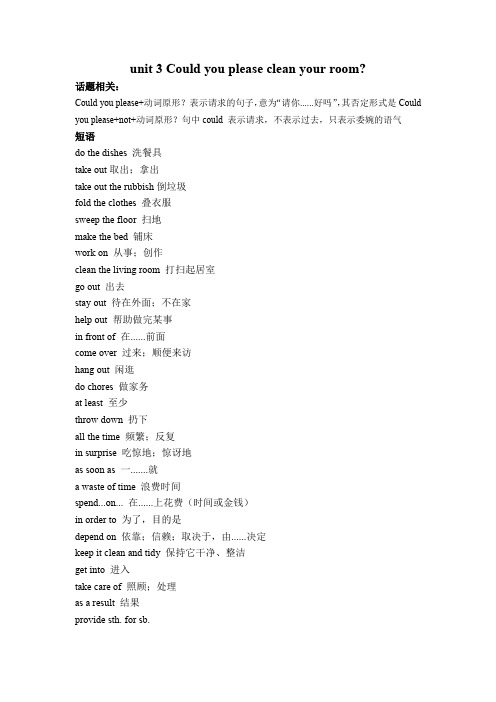
unit 3 Could you please clean your room?话题相关:Could you please+动词原形?表示请求的句子,意为“请你......好吗”,其否定形式是Could you please+not+动词原形?句中could 表示请求,不表示过去,只表示委婉的语气短语do the dishes 洗餐具take out取出;拿出take out the rubbish倒垃圾fold the clothes 叠衣服sweep the floor 扫地make the bed 铺床work on 从事;创作clean the living room 打扫起居室go out 出去stay out 待在外面;不在家help out 帮助做完某事in front of 在......前面come over 过来;顺便来访hang out 闲逛do chores 做家务at least 至少throw down 扔下all the time 频繁;反复in surprise 吃惊地;惊讶地as soon as 一.......就a waste of time 浪费时间spend...on... 在......上花费(时间或金钱)in order to 为了,目的是depend on 依靠;信赖;取决于,由......决定keep it clean and tidy 保持它干净、整洁get into 进入take care of 照顾;处理as a result 结果provide sth. for sb.=provide sb. with sth. 为某人提供某物a developed country 一个发达国家a developing country 一个发展中国家a life of independence 独立的生活an independent country 一个独立自主的国家have no idea “不知道”=don't knowtake care of “照顾;处理”=look after=care for take good care of “好好照顾......”=look after.....well as a result 结果;因此as a result of 由于.......;作为......结果句型和固定结构finish doing sth. 做完某事neither+连系动词be/助动词/情态动词+主语. .....也不hate to do sth. 厌恶做某事let sb. do sth. 让某人做某事spend...doing sth. 花费......做某事provide sth. for sb. 向某人提供某物learn to do sth. 学会做某事learn how to do sth. 学会怎样做某事do one's part in (doing) 尽自己的职责做某事as.....as... 与.......一样not as/so...as... 不如......borrow sth. from sb. “向某人借某物”hate sb./sth. 讨厌某人/某物hate to do sth./doing sth. 厌恶做某事enjoy doing sth 喜欢做某事buy sb.sth.=buy sth. for sb. "给某人买某物invite sb. to +地点名词“邀请某人到某地”invite sb. to do sth. “邀请某人做某事”make sb. do sth. 让/使某人做某事help with sth. =help (to) do sth.帮忙做某事There is no need for sb. to do sth.“对于某人来说,没有必要做某事”解释minute n.分钟;片刻(1)any minute now “随时;马上;在任何时刻”,表示事情有可能在极短的时间内发生或眼下就要发生。
(完整版)英语人教版八年级下册Unit3Couldyouplease--
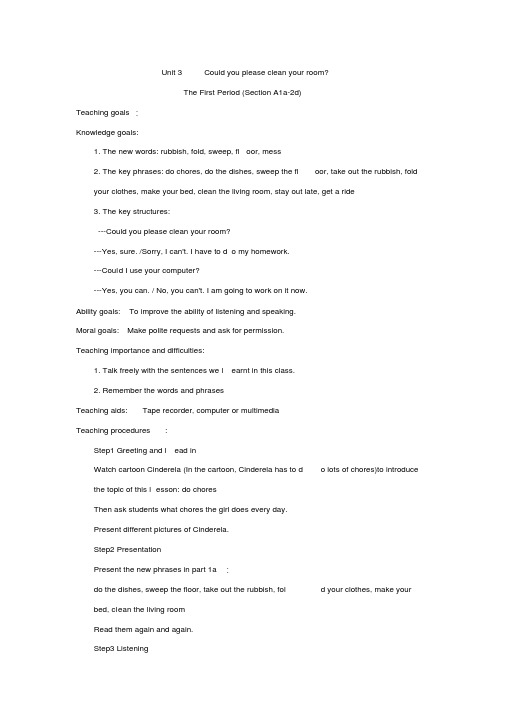
Unit 3 Could you please clean your room?The First Period (Section A1a-2d)Teaching goals:Knowledge goals:1. The new words: rubbish, fold, sweep, fl oor, mess2. The key phrases: do chores, do the dishes, sweep the fl oor, take out the rubbish, foldyour clothes, make your bed, clean the living room, stay out late, get a ride3. The key structures:---Could you please clean your room?---Yes, sure. /Sorry, I can't. I have to d o my homework.---Could I use your computer?---Yes, you can. / No, you can't. I am going to work on it now.Ability goals: To improve the ability of listening and speaking.Moral goals: Make polite requests and ask for permission.Teaching importance and difficulties:1. Talk freely with the sentences we l earnt in this class.2. Remember the words and phrasesTeaching aids: Tape recorder, computer or multimediaTeaching procedures :Step1 Greeting and l ead inWatch cartoon Cinderela (In the cartoon, Cinderela has to d o lots of chores)to introduce the topic of this l esson: do choresThen ask students what chores the girl does every day.Present different pictures of Cinderela.Step2 PresentationPresent the new phrases in part 1a:do the dishes, sweep the floor, take out the rubbish, fol d your clothes, make your bed, cl ean the living roomRead them again and again.Step3 ListeningT: Peter’s room is untidy, peter and his mother are at home, what shoul d they d o?chores or Mom’s chores?1. Now listen to the tape player, then finish part 1b. Peter’sListen it the first time, and check the answers2. Listen it again, then pay attention to the question:T: How does Mum ask peter to help her?----Could you please …?----Yes, sure. / Sorry, I can’t, I have to…Step 4 Pair workLook at the picture in 1a, ask your partner to d o the chores that you see.Example:A: Could you please sweep the fl oor?B: Yes, sure. Can you d o the dishes?ean the living room.A: Well, could you please do them? I ‘m going to clB: No problem.Step 5 Listening1. Look through the tasks in 2a and 2b carefully before listening.2. Play the tape the first time, let the students finish part 2a3. Play the tape the second time and let the stud ents finish the tasks 2b.4. Listen to the tape once more and ask the students to repeat after the tape and checkthe answers by themselves.Question: How to ask for permission?总结请求许可时,常用句型:---Could I…?---Yes, you can. / Sorry, you can’t.Step 6 Group workfather, Peter asks his father if he can do three Student A is Peter, Student B is Peter’smore t hings. Say “yes” or “no”, and give a reason. Such as:A: Could I use your computer?B: Sorry. I’m going to work on it now.A : Well, could I watch TV?B: Yes, you can. But first you have to clean your roomStep 7 Self-studyAsk the students to learn 2d by themselves and finish the tasks of self-study.1. Let students read the conversation loudly, then come up with some questions. Thestudent who raises a question will get 2 points. And the student who answers it will get1 point.2. Read it carefully, then find out the new words and difficult points. Let students showthem in class.3. Role-play the conversation in groups.Step 8 Language points1.Tony, could you please help out with a few things?help out (with something) 是一个动词短语, 表示在某人繁忙或是遇到困难时“给予帮助”。
人教版英语八年级下册Unit3《Couldyoupleasecleanyourroom》说课稿
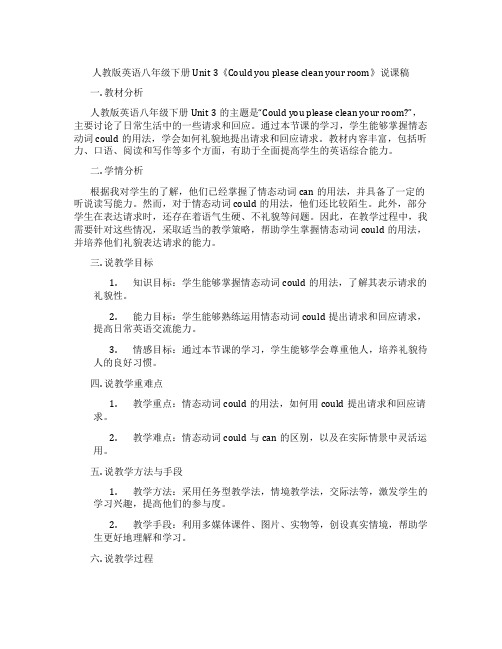
人教版英语八年级下册Unit 3《Could you please clean your room》说课稿一. 教材分析人教版英语八年级下册Unit 3的主题是“Could you please clean your room?”,主要讨论了日常生活中的一些请求和回应。
通过本节课的学习,学生能够掌握情态动词could的用法,学会如何礼貌地提出请求和回应请求。
教材内容丰富,包括听力、口语、阅读和写作等多个方面,有助于全面提高学生的英语综合能力。
二. 学情分析根据我对学生的了解,他们已经掌握了情态动词can的用法,并具备了一定的听说读写能力。
然而,对于情态动词could的用法,他们还比较陌生。
此外,部分学生在表达请求时,还存在着语气生硬、不礼貌等问题。
因此,在教学过程中,我需要针对这些情况,采取适当的教学策略,帮助学生掌握情态动词could的用法,并培养他们礼貌表达请求的能力。
三. 说教学目标1.知识目标:学生能够掌握情态动词could的用法,了解其表示请求的礼貌性。
2.能力目标:学生能够熟练运用情态动词could提出请求和回应请求,提高日常英语交流能力。
3.情感目标:通过本节课的学习,学生能够学会尊重他人,培养礼貌待人的良好习惯。
四. 说教学重难点1.教学重点:情态动词could的用法,如何用could提出请求和回应请求。
2.教学难点:情态动词could与can的区别,以及在实际情景中灵活运用。
五. 说教学方法与手段1.教学方法:采用任务型教学法,情境教学法,交际法等,激发学生的学习兴趣,提高他们的参与度。
2.教学手段:利用多媒体课件、图片、实物等,创设真实情境,帮助学生更好地理解和学习。
六. 说教学过程1.导入:通过播放一段关于孩子们日常生活的视频,引出本节课的主题“Could you please clean your room?”。
2.新课呈现:介绍情态动词could的用法,并通过例句展示如何用could提出请求和回应请求。
- 1、下载文档前请自行甄别文档内容的完整性,平台不提供额外的编辑、内容补充、找答案等附加服务。
- 2、"仅部分预览"的文档,不可在线预览部分如存在完整性等问题,可反馈申请退款(可完整预览的文档不适用该条件!)。
- 3、如文档侵犯您的权益,请联系客服反馈,我们会尽快为您处理(人工客服工作时间:9:00-18:30)。
Unit 3 Could you please clean your room?
Period 1 (Section A 1a—1c)
Ⅰ. Teaching aims
ⅰ.Learn the new expressions for different chores, like do the dishes, sweep the floor, take out the rubbish and so on. ⅱ.Learn to make polite requests using “Could you please…?”ⅲ.Encourage students to help their parents do chores.
Ⅱ. Important and difficult keys
Important keys
ⅰ.Learn key words and expressions.
ⅱ.Learn to make polite requests using “Could you please…?”Difficult key
How to answer the question “ Could you please…?”
Ⅲ. Teaching procedures
Step ⅰ Lead-in
(ⅰ) Greet the students as usual
(ⅱ) Ask students the meaning of “family”, it means ,“Father and mother ,I love you.”Next ,show students two questions, “Do you love your parents?”“Do you do chores at home?”Tell them do chores means do housework(做家务).They can answer the questions together.
(ⅲ) Then , play a flash for students, ask them what it is
talking about.
Step ⅱ Presentation
(ⅰ) New words and phrases.
Show some pictures on the whiteboard, ask students to say what they are doing in Chinese, and then teach them the new phrases. Such as, do the dishes, take out the rubbish and so on, and read after me. At the same time, let them pay attention to some keys.
(ⅱ) Challenge
Show the students some phrases in Chinese, ask some students to say out their English expressions, which can check teaching and learning.
Step ⅲPractice
(ⅰ) Look and say
This activity aims to review the new phrases.
There are some cards on the teacher’s desk. And at the corner of the classroom, there are some cleaning tools, too.
First, tell students what to do in this activity and how to do it.
Then, invite some students to perform in pairs. A student acts the other finds out the phrase. Next, put up the cards on the blackboard one by one. At the same time, add a new phrase,
mop the floor(拖地).Also, ask a student to take out the rubbish, I can give her three sentences,“Take out the rubbish.”“Please take out the rubbish.”“Could you please take out the rubbish?”According to her responses, let students choose a more polite sentence. Finally, introduce the structure “Could you please…?” Tell them when we want to make polite requests, we can use the structure “Could you please…?”and we can make conversations like this ,
A: Could you please...?
B: Yes, sure. / All right. /No problem. / Certainly.
So rry, I can’t. I have to do...
Sorry, I can’t. I am doing...
Show students conversations, let them know how to response.
(ⅱ) Invite some students to answer questions using “Yes./ Sure. / All right. ”“ Sorry, I have to…”and so on. StepⅳListening
Activity 1b
Read the instruction. Point to the chart, show students the columns with the heading Peter’s mother and Peter.
Tell students that they will hear a conversation between Peter and his mother. They have to listen to the recording
carefully and check the chores Peter’s mother or Peter does.
Play the recording the first time. Students only listen.
Then play a flash, ask students to check their answers.
Later correct the answers.
Step ⅴ Pair work
Activity 1c
Tell students today is their house Clean-up Day. Make conversations between them and their parents using the new phrases and structures.
Give them several minutes to do it. Then invite some pairs to act it out for the class.
StepⅵConsolidation
Do some exercises for consolidation.
StepⅶSummary
In this period, we’ve learned how to make polite requests. Through some listening and speaking practice, we consolidated The target language and we know we should love our parents and help them with housework at home.
Step ⅷHomework
(ⅰ) Remember the new phrases.
(ⅱ) Learn to how to use the new structure.。
